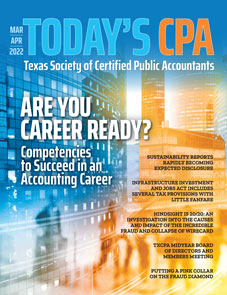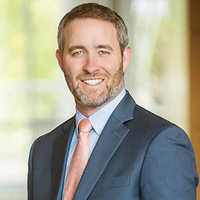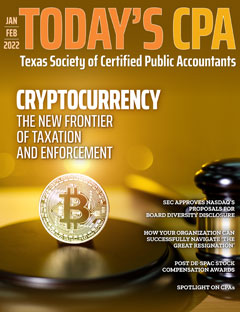Infrastructure Investment and Jobs Act Includes Several Tax Provisions with Little Fanfare
Tax Topics
By Don Carpenter, MSAcc/CPA
On November 15, 2021, President Joe Biden signed into law H.R. 3684, popularly called the Infrastructure Investment and Jobs Act (Infrastructure Act), in a bipartisan ceremony at the White House. The focus of the legislation was spending of $1.2 trillion to address infrastructure improvements for the nation’s highways, rail systems, water supply and broadband access among other items.
As is typical of large bills, several lesser publicized issues were also addressed. Included among these issues are several notable tax items. These items are not necessarily related to infrastructure spending but address a hodgepodge of issues. This article therefore does not attempt to link these provisions to the spending portions of the bill.
Enhanced Reporting for Digital Assets
Cryptocurrency has been a focus of both Congress and financial markets for some time now as described by the Today’s CPA article in the January/February 2022 issue titled “Cryptocurrency: The New Frontier of Taxation and Enforcement.”
For transactions after January 1, 2023, brokers must now report cryptocurrency transactions to the IRS consistent with the reporting of other capital asset transactions such as stocks and bonds. In addition, businesses must report cryptocurrency payments in excess of $10,000 similar to the requirements for cash transactions.
Employee Retention Credit Ended
The employee retention credit created by the Coronavirus Aid, Relief, and Economic Security Act (CARES Act, March 2020) instituted a credit for wages paid to employees in an effort to counteract the employment effects of the pandemic. This credit was later extended by the American Rescue Plan Act of 2021 to include wages paid in the third and fourth quarter of 2021.
The current Infrastructure Act repeals the applicability of the credit for wages paid in the fourth quarter with the exception of recovery startup businesses.
Automatic Relief Granted for Natural Disasters and Other Emergencies
The Infrastructure Act makes the filing extensions for natural disasters automatically 60 days, giving assurance to taxpayers with regard to filing deadlines. Although the IRS generally granted the 60-day extension, the length of the deadline was not previously automatic and this introduced some doubt into the process. It separately extends the deadline for filing a petition in Tax Court if that court is inaccessible or closed, which may occur due to a natural disaster or pandemic.
The Act also modifies the existing automatic extension of certain tax filing deadlines by amending the definition of a disaster area to include any area that receives financial assistance from the president under the Robert T. Stafford Disaster Relief and Emergency Assistance Act. The impetus for this modification was the extensive wildfires experienced over the past several years in the West and Midwest.
Extension of Pension Funding Relief
The Act grants single employer pension funds more flexibility with regard to funding pension obligations by extending the smoothing provisions of the American Rescue Plan from 2029 to 2034.
Minimum funding requirements for defined benefit plans are determined using corporate bond interest rates. In 2012, the concept of an interest rate stabilization corridor was adopted and it provided that interest rates used could not be more than 10% above or below the 25-year average of corporate bond interest rates. This “smoothed” the impact of a spike in interest rates. The interest rate stabilization corridor was originally scheduled to begin phasing out in 2013, but with the extension in the Infrastructure Act, it will remain in effect until at least 2034.
Tax Treatment of Contributions to the Capital of a Corporation are Modified
The Infrastructure Act added a special exclusion from income for qualified contributions to the capital of a corporation for certain regulated public water and sewage disposal utilities as part of the focus on improving the water supply and replacing aging pipes. A contribution in aid of construction will qualify if it meets the definition to be provided by the Treasury.
The exemption only applies to “regulated” utilities that furnish water or sewage services under rates set by a governing body. The amount contributed is also excluded from the utilities base for purpose of rate setting.
The exemption is available for contributions made after December 31, 2020.
Expanded Definition of Exempt Facility Bonds
The Act expanded the definition of qualifying expenditures for exempt facility bonds to include certain qualified broadband projects and carbon dioxide capture facilities. Interest earned on these bonds by investors will be exempt from federal (and possibly state) income taxes if the exempt facility bond requirements are met.
The Act also provided a partial exemption to the private activity bond volume cap for exempt facility bonds related to these projects and increased the national limitation amount for qualified highway or surface freight transportation facilities.
Credit for Nuclear Plants
In an effort to encourage financially struggling nuclear power plants to remain operational, the provision creates and funds a $6 billion credit program to prevent early closure of nuclear facilities.
When applying for the credit, applicants must provide “known information on the source of produced uranium and the location where the uranium is converted, enriched and fabricated into fuel assemblies for the nuclear reactor for the four-year period for which credits would be allocated.” Priority will be given for uranium processed in the United States.
The Act also funds $3.2 billion for Advanced Reactor Demonstration Program support. The intent of this program is to create a partnership between government and the nuclear industry to accelerate the advancement of nuclear power.
Extension of Excise Taxes
The excise taxes on fuels, retail sales of heavy trucks and trailers, and tires are extended through 2028.
In addition, Superfund excise taxes were reinstated through 2031. These excise taxes are levied on the use of certain chemicals used by the petroleum and chemical industries. They were implemented by CERCLA in 1980 but were allowed to expire in 1995. The Infrastructure Act reimposes these taxes at varying rates on a chemical-by-chemical basis. It also lowers the threshold from 50% to 20% on the content of a chemical in a product before the tax is applied. The revenue from these taxes is earmarked to be used by the EPA for cleanup of designated hazardous waste sites.
The tax provisions described above are almost inconsequential in terms of the overall $1.2 billion price tag for the initiatives in the Infrastructure Act. However, the provisions address a broad array of tax issues with many of the revenue raisers intended to advance the clean energy and infrastructure priorities of Washington, D.C.
About the Author: Don Carpenter is clinical professor of accounting at Baylor University. Contact him at Don_Carpenter@baylor.edu.







